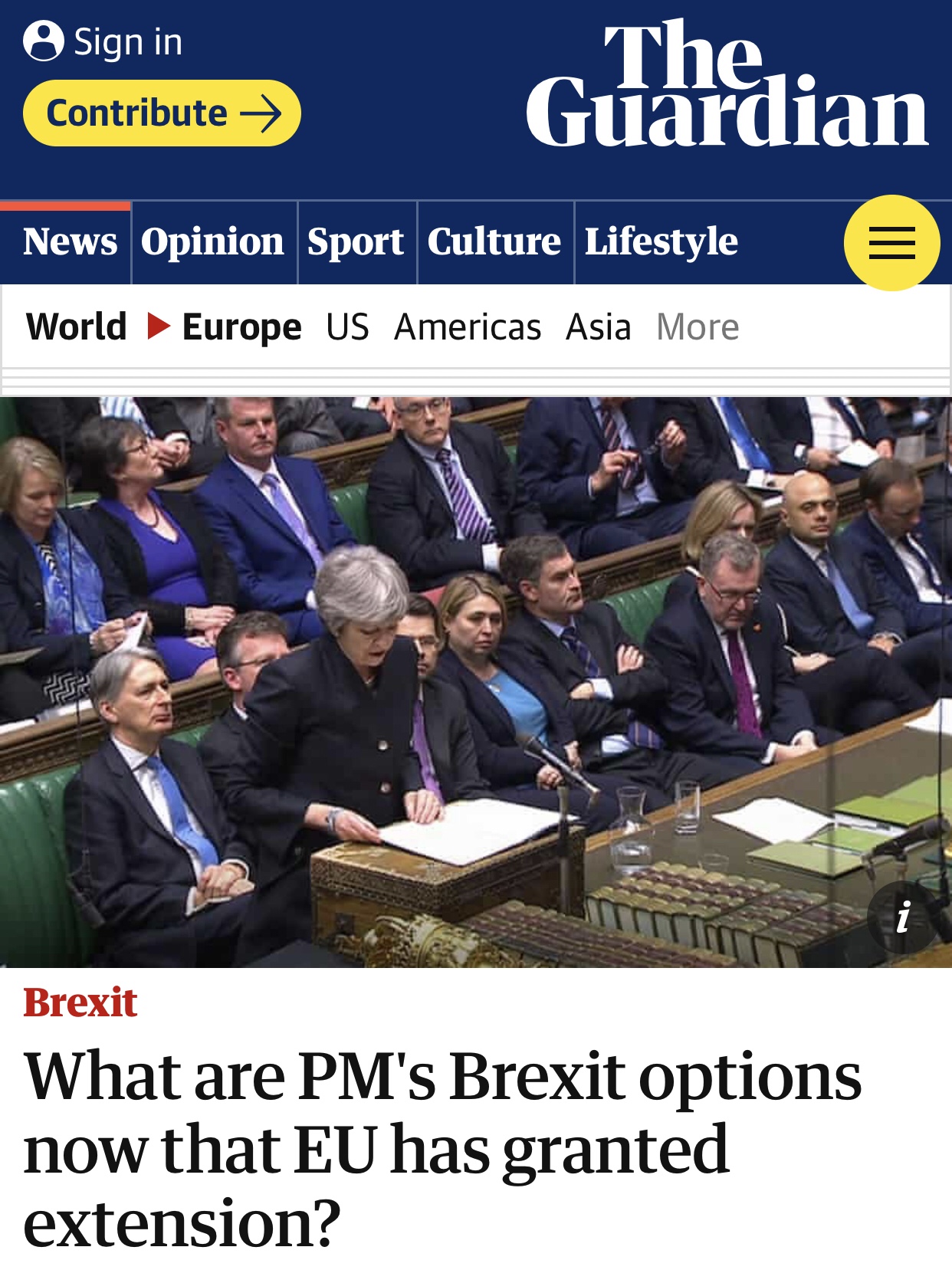The Guardian: What are PM’s Brexit options now that EU has granted extension?
After the EU granted a Brexit extension until 31 October, or sooner if Theresa May can get a deal through the Commons before then, the Guardian have had a look at the prime minister’s options.
1. Strike a pact with Jeremy Corbyn
Labour says the government is engaging seriously in the negotiations, which were announced by the prime minister in a dramatic Downing Street statement after last week’s marathon cabinet meeting.
But it is unclear whether leave-supporting cabinet ministers, or even the prime minister herself, are ready to stomach the compromises that would be required to win a majority in parliament.
If the two sides could strike a deal though, they could agree a parliamentary timetable for ratification – in theory at least, before the 22 May deadline for participation in European parliament elections.

2. Agree a plan for Commons votes with Labour
May has said that if she cannot reach a Brexit deal with the opposition, she hopes to persuade them to sign up to some process of parliamentary votes, which both sides would then agree to abide by.
But it is unclear whether a majority would emerge for any option even then: there was some discussion at the marathon seven-hour cabinet meeting about using some preferential voting system.
But if a softer deal, with a customs union, did emerge on top, May could say, as she did with the request to delay Brexit, that the outcome wasn’t her choice, but had been forced on her, and she would obey the will of parliament and enact it.
3. Bring her deal back to parliament – again
May continues to believe that her deal is better than any compromise agreement she is likely to strike with Labour – and unlike such a deal, it has the backing of her cabinet.
There had been rumours at Westminster that she could venture a fourth vote on her deal on Friday, in the hope that the unpalatable prospect of fighting European elections would tempt more colleagues to support it.
The government has backed away from that idea, sending exhausted MPs off for an Easter break instead.
But if the talks with Labour fail even to agree a process for finding a majority in parliament, she could still attempt to bring her deal back in some form, perhaps by tabling the withdrawal agreement bill. Or it could be laid down as one option in a process of indicative votes.
4. Call a general election
When her deal was rejected by MPs for a third time last month, May appeared to hint that she would consider calling a general election to break the impasse at Westminster, telling MPs: “I fear we are reaching the limits of this process in this house.”
She could still judge – perhaps after another spring walking holiday like the one she took in 2017 – that a general election could provide a way out.
But cabinet was warned last week that the Tory party was ill-prepared to fight a general election and struggling in the polls. Moreover, CCHQ sources suggest the pool of prospective parliamentary candidates is just as divided on Brexit as the current crop of MPs, so even a solid majority wouldn’t necessarily solve the conundrum.
Under the Fixed-term Parliaments Act she could only call an election with the backing of two-thirds of MPs anyway; and many on her own side would view with dread the idea of once again boarding the Maybot’s “strong and stable” battle bus.
5. Call a referendum
May believes her deal – which would allow the government to control migration – is closer to what Brexit voters want, than the alternatives.
And ardent supporters of the remain cause have said they would be willing to vote for the prime minister’s deal, if she would allow the public to ratify it, in a “confirmatory” referendum – which of course they would then hope to use to overturn the result of the 2016 poll.
The prime minister has never seemed the slightest bit tempted by that quid pro quo, even suggesting “social cohesion” could be threatened by another vote – and she’s hardly renowned as the world’s greatest campaigner.
6. Resign
When May said before the last Brussels summit that “as prime minister”, she did not want to see Brexit delayed beyond 30 March, some MPs read it as a promise to resign, rather than accept a longer extension to article 50.
She has now had to swallow her pride and accept a six-month delay; and was forced to offer to step down once Brexit is over, to win the support of Boris Johnson and others for her deal. He and a plethora of others have been jockeying for position ever since.
Perhaps she might judge on this year’s walking break that enough is enough, and one of them should be given the chance to push Brexit over the line: but her resilience and staying-power are, of course, legendary.
Source: The Guardian
You must be logged in to post a comment.